Intro
Discover the role of ACTH hormone in regulating cortisol levels, adrenal function, and stress response, exploring its effects on overall health and wellness, including hormone imbalance and endocrine disorders.
The adrenal cortex, a part of the adrenal glands, plays a crucial role in producing various hormones essential for maintaining the body's homeostasis. One such hormone is the adrenocorticotropic hormone (ACTH), which is produced by the pituitary gland. ACTH is a vital hormone that stimulates the adrenal glands to produce cortisol, a hormone that helps the body respond to stress, regulates blood sugar levels, and aids in the metabolism of fat, protein, and carbohydrates. Understanding ACTH and its functions is essential for comprehending the body's endocrine system and its role in maintaining overall health.
The production of ACTH is triggered by the hypothalamus, a region in the brain that acts as the primary regulator of the body's endocrine system. The hypothalamus produces corticotropin-releasing hormone (CRH), which stimulates the pituitary gland to release ACTH. In turn, ACTH stimulates the adrenal glands to produce cortisol, creating a negative feedback loop that helps regulate the production of these hormones. This complex interplay between the hypothalamus, pituitary gland, and adrenal glands is crucial for maintaining the body's homeostasis and responding to stress.
The balance of ACTH and cortisol is delicate, and any disruptions can have significant effects on the body. For instance, an overproduction of ACTH can lead to an increase in cortisol levels, causing a range of symptoms, including weight gain, high blood pressure, and mood changes. On the other hand, a deficiency in ACTH can lead to a decrease in cortisol levels, causing fatigue, weakness, and changes in skin pigmentation. Understanding the role of ACTH in regulating cortisol production is essential for diagnosing and treating disorders related to the endocrine system.
What is ACTH Hormone?
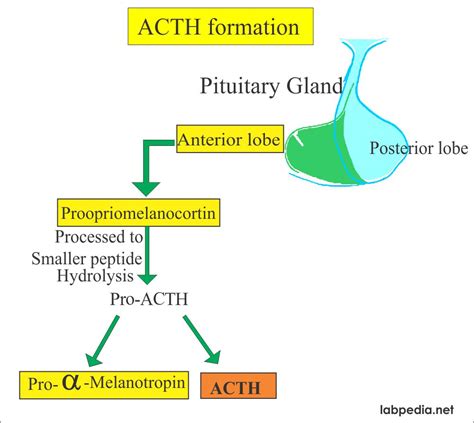
The adrenocorticotropic hormone (ACTH) is a peptide hormone produced by the pituitary gland, a small endocrine gland located at the base of the brain. ACTH is a tropic hormone, meaning it stimulates the production of other hormones. In this case, ACTH stimulates the adrenal glands to produce cortisol, a hormone that plays a vital role in responding to stress, regulating blood sugar levels, and aiding in the metabolism of fat, protein, and carbohydrates. ACTH is produced by the anterior pituitary gland, which is the front part of the pituitary gland, and is released into the bloodstream, where it travels to the adrenal glands.
Functions of ACTH
The primary function of ACTH is to stimulate the adrenal glands to produce cortisol. Cortisol is a hormone that plays a vital role in responding to stress, regulating blood sugar levels, and aiding in the metabolism of fat, protein, and carbohydrates. ACTH also stimulates the adrenal glands to produce other hormones, such as aldosterone, which helps regulate blood pressure, and androgens, which are male sex hormones. In addition to stimulating hormone production, ACTH also helps regulate the growth and development of the adrenal glands.How is ACTH Produced?
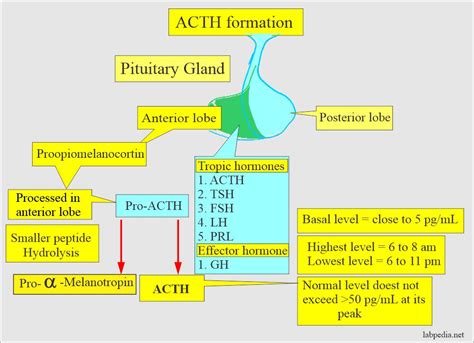
The production of ACTH is triggered by the hypothalamus, a region in the brain that acts as the primary regulator of the body's endocrine system. The hypothalamus produces corticotropin-releasing hormone (CRH), which stimulates the pituitary gland to release ACTH. The pituitary gland produces ACTH in response to CRH, and the amount of ACTH produced depends on the amount of CRH released by the hypothalamus. The production of ACTH is also influenced by negative feedback from cortisol, which helps regulate the amount of ACTH produced.
Regulation of ACTH Production
The production of ACTH is regulated by a negative feedback loop that involves the hypothalamus, pituitary gland, and adrenal glands. When cortisol levels are high, the hypothalamus reduces the production of CRH, which in turn reduces the production of ACTH. This decrease in ACTH production leads to a decrease in cortisol production, creating a negative feedback loop that helps regulate the production of these hormones. The regulation of ACTH production is crucial for maintaining the body's homeostasis and responding to stress.What are the Benefits of ACTH?
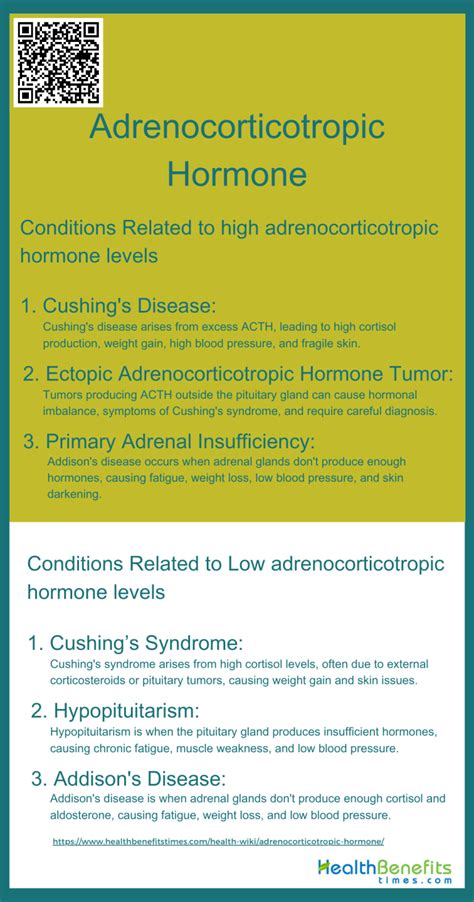
The benefits of ACTH are numerous and play a vital role in maintaining the body's homeostasis. Some of the benefits of ACTH include:
- Stimulating the production of cortisol, which helps the body respond to stress
- Regulating blood sugar levels
- Aiding in the metabolism of fat, protein, and carbohydrates
- Stimulating the production of other hormones, such as aldosterone and androgens
- Helping regulate the growth and development of the adrenal glands
Disorders Related to ACTH
Disorders related to ACTH can have significant effects on the body. Some of the disorders related to ACTH include: * Cushing's syndrome, which is caused by an overproduction of cortisol * Addison's disease, which is caused by a deficiency in cortisol * Congenital adrenal hyperplasia, which is a genetic disorder that affects the production of cortisol and other hormones * Pituitary tumors, which can affect the production of ACTH and other hormonesHow is ACTH Diagnosed?
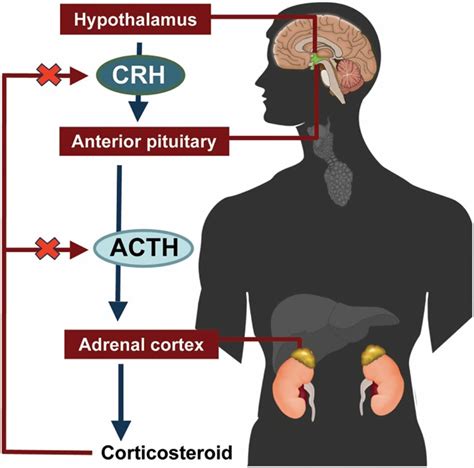
The diagnosis of ACTH-related disorders typically involves a combination of physical examination, medical history, and laboratory tests. Some of the laboratory tests used to diagnose ACTH-related disorders include:
- Blood tests to measure the levels of ACTH and cortisol
- Urine tests to measure the levels of cortisol and other hormones
- Imaging tests, such as CT or MRI scans, to visualize the pituitary gland and adrenal glands
- Stimulation tests, such as the ACTH stimulation test, to evaluate the response of the adrenal glands to ACTH
Treatment of ACTH-Related Disorders
The treatment of ACTH-related disorders depends on the underlying cause of the disorder. Some of the treatments used to manage ACTH-related disorders include: * Medications to regulate the production of cortisol and other hormones * Surgery to remove tumors or other abnormalities that are affecting the production of ACTH and other hormones * Hormone replacement therapy to replace deficient hormones * Lifestyle changes, such as diet and exercise, to help manage stress and regulate blood sugar levelsWhat are the Risks of ACTH-Related Disorders?
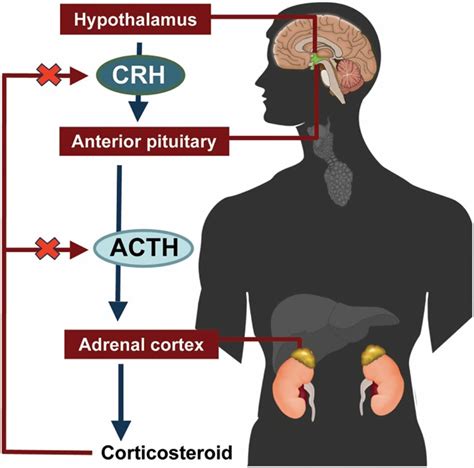
The risks of ACTH-related disorders can be significant and may include:
- Cushing's syndrome, which can cause a range of symptoms, including weight gain, high blood pressure, and mood changes
- Addison's disease, which can cause fatigue, weakness, and changes in skin pigmentation
- Congenital adrenal hyperplasia, which can cause a range of symptoms, including ambiguous genitalia, salt wasting, and failure to thrive
- Pituitary tumors, which can cause a range of symptoms, including headaches, vision changes, and hormone imbalances
Prevention of ACTH-Related Disorders
Preventing ACTH-related disorders is crucial for maintaining the body's homeostasis and reducing the risk of complications. Some of the ways to prevent ACTH-related disorders include: * Maintaining a healthy lifestyle, including a balanced diet and regular exercise * Managing stress through relaxation techniques, such as meditation and yoga * Avoiding certain medications that can affect the production of ACTH and other hormones * Getting regular check-ups with a healthcare provider to monitor hormone levels and detect any abnormalities earlyConclusion and Future Directions
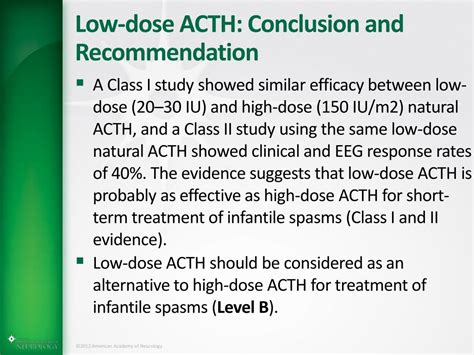
In conclusion, ACTH is a vital hormone that plays a crucial role in maintaining the body's homeostasis. Understanding the functions, production, and regulation of ACTH is essential for diagnosing and treating disorders related to the endocrine system. Further research is needed to fully understand the mechanisms of ACTH and its role in maintaining the body's homeostasis. By continuing to study ACTH and its related disorders, we can develop new treatments and therapies to manage these conditions and improve the quality of life for individuals affected by them.
We invite you to share your thoughts and questions about ACTH and its related disorders. Please comment below and share this article with others who may be interested in learning more about this vital hormone.
What is the primary function of ACTH?
+The primary function of ACTH is to stimulate the adrenal glands to produce cortisol, a hormone that helps the body respond to stress, regulates blood sugar levels, and aids in the metabolism of fat, protein, and carbohydrates.
How is ACTH produced?
+ACTH is produced by the pituitary gland in response to corticotropin-releasing hormone (CRH) released by the hypothalamus.
What are the benefits of ACTH?
+The benefits of ACTH include stimulating the production of cortisol, regulating blood sugar levels, aiding in the metabolism of fat, protein, and carbohydrates, and helping regulate the growth and development of the adrenal glands.
